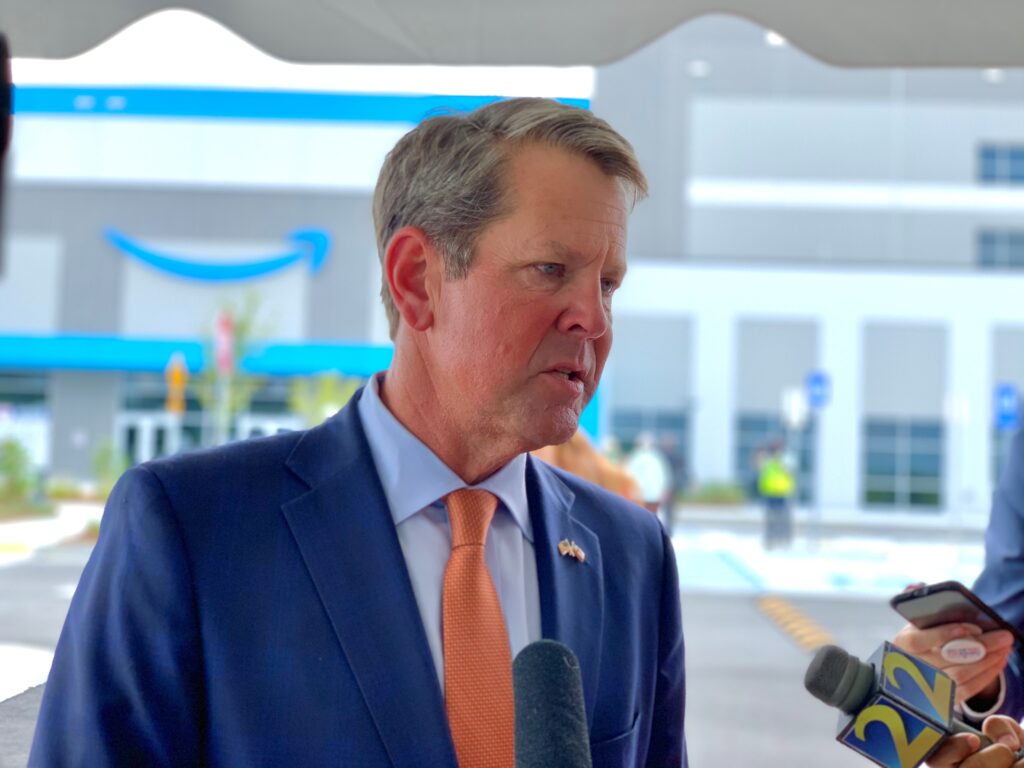
ATLANTA – A $1.9 trillion federal COVID-19 relief package moving in Congress that would send aid directly to cities and counties has drawn backlash from Gov. Brian Kemp, who says its funding formula shortchanges Georgia.
Dubbed the “American Rescue Plan,” the latest relief package would divvy up $195 billion to state governments based on how many people are unemployed in each state, departing from the formula in previous COVID-19 packages that distributed relief based on population.
Kemp slammed the funding formula on Tuesday, arguing it would send less money to states like Georgia that have kept businesses open through most of the pandemic’s tenure, while benefitting states like California and New York that have locked down more often.
But backers of the plan point out an additional $130 billion would be sent directly to city and county governments based on their populations and poverty levels, marking a new payment round that skirts state oversight unlike previous packages passed since March of 2020.
They argue Georgia’s share of the new relief funds should hand the state more than $8 billion in COVID-19 aid, of which a large chunk would go straight to struggling city and county governments and give them more flexibility to shore up their pandemic-struck budgets.
Kemp, a Republican eying reelection in 2022, estimated that tying funding amounts to unemployment would leave Georgia with $1.3 billion less in relief than if allocations were based on a state’s population – an amount other analysts in Georgia have not yet verified.
“The COVID-19 relief package, as currently written, is a slap in the face to hardworking Georgians, small businesses and countless families who struggled to make ends meet throughout the pandemic,” Kemp said in an editorial published Monday on Fox News.
“Congress should take action immediately by changing the bill to level the playing field for all states.”
The nonprofit Georgia Budget and Policy Institute (GBPI) disputed Kemp’s characterization of the Biden-backed package’s potential impact, though the group has not yet done a full analysis of the $1.9 trillion plan’s many funding branches, said GBPI Senior Policy Analyst Danny Kanso.
He highlighted previous aid packages, including last year’s $2.2 trillion Coronavirus Aid, Relief and Economic Security (CARES) Act, which pumped funding through state officials to apportion to local governments. The current package under consideration is both larger for local governments and partly cuts out the state as broker, Kanso said.
“The CARES Act sent $150 billion out of the $2.2 trillion plan, so Georgia is currently getting both more raw dollars, and a higher share of the funding is directed specifically to state and local governments,” Kanso said, noting the latest funding round will send $350 billion to state and local officials.
The nonprofit Georgia Public Policy Foundation, meanwhile, sided with Kemp in questioning the unemployment-focused funding formula, agreeing that Georgia’s aid share would be higher with a more population-centric calculation.
Kyle Wingfield, the foundation’s president and CEO, also noted many state and local governments have not spent all their funds from previous rounds of COVID-19 aid, even as revenues have rebounded in states like Georgia that have kept businesses more open than elsewhere.
“To throw the unemployment rate in there as a new thing is certainly going to distort this allocation in favor of states that have kept their economies closed versus those that have tried to strike a balance between public health and keeping their economies from going into a free-fall,” Wingfield said.
Kemp, who has long touted Georgia’s economic recovery by keeping businesses open during the pandemic, called on recently seated U.S. Sens. Jon Ossoff and Raphael Warnock to “use their considerable influence” in the Democrat-controlled Congress to revise the relief package.
Both Ossoff and Warnock – the first Democrats to capture Georgia’s two Senate seats in 15 years – plan to vote in favor of the new relief package that has backing from President Joe Biden’s administration, their offices confirmed Tuesday.
In a statement, Ossoff said the relief package would help bolster “smaller cities, counties, towns and rural communities have not received the federal support they need and deserve.”
Separately, Warnock called the package “robust relief” that can now clear the Democrat-controlled Congress “so we can finally get these federal investments out the door and into the hands of Georgians who’ve waited too long for help.”
Beyond state and local government funding, the relief package contains dozens of aid measures including billions of dollars to fund COVID-19 testing and vaccine production, emergency rental assistance, extended higher unemployment benefits and $1,400 stimulus checks for most Americans.
The Biden administration confirmed Tuesday that $350 billion of the relief package would go toward state, local and tribal governments, plus another nearly $130 billion dedicated for reopening schools across the country.
Of that amount, Georgia’s state and local share would be $8.3 billion, plus another $4.5 billion for K-12 schools, an administration spokesman confirmed. That’s on top of a $1,600 tax credit for more than 1 million low-income Georgia families, a $27 bump in supplemental nutrition benefits per person and a roughly $1,000 earned-income tax credit for adults.
“We can disagree on the precise way this money is allocated to state and local governments, but President Biden’s plan put forward $350 billion to keep cops, firefighters and teachers on the job, and the Republican proposal was for $0,” said White House spokesperson Mike Gwin.
“And when Republicans had a chance to support this funding in the House, they voted against it unanimously.”
The package gained House passage on Feb. 27 with Georgia’s six Democratic members voting in favor and eight Republican members voting against.
This story has been updated to include additional input from the Biden administration.

